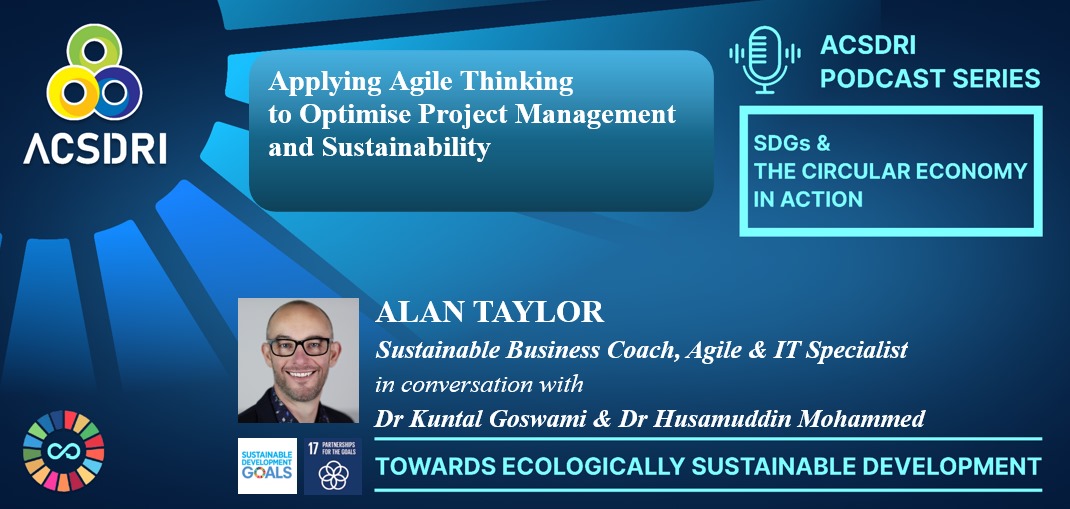
UNDERSTANDING AGILE THINKING TO OPTIMISE SUSTAINABILITY PRACTICE
By Dr. Kuntal Goswami, Australian Centre for Sustainable Development Research & Innovation (ACSDRI)
Abstract: Our Blue Planet is on the verge of human-induced climate change and interlinked ecological alternation. Hence, society needs collective commitment to shift towards Ecologically Sustainable Development (ESD). However, the transition toward holistic ESD also needs an underlying sophisticated thought process to implement sustainability practices.
In this aspect, Agile Thinking is posed as the best-fit thought process to advance sustainability practices, as the Agile way of thinking is ingrained in sustainability values. Since its inception in 2001, the Agile Manifesto states, “…Agile processes promote sustainable development…”
In this context, ACSDRI organized a PODCAST with ALAN TAYLOR, an Agile Consultant and Sustainability Coach, to understand Agile as a concept, how it optimises organizational efficiency and effectiveness, and how Agile thinking can optimise the advancement of Sustainability Practices.Sustainability
Key words: Agile Manifesto, Agile Thinking, Creative Thinking, Critical Thinking, Innovation, Sustainability, Ecologically Sustainable Development (ESD), Stakeholder Engagement.
Presented by Alan Taylor,Sustainable Business Coach, Agile & IT Specialist, inconversation with Dr Kuntal Goswami, Dr Husamuddin Mohammed, and Binish Nida Afaque
Alan Taylor is an Executive, and an Agile & Team Coach with over 18 years of experience in project management, consulting, and coaching. He is a lifelong learner, passionate about enabling the best in people and systems in business and for our environment. Alan is an ICF-accredited coach and convener of the ANZ communities of the Climate Coaching Alliance and Inner Development Goals.
The Podcast addresses SDG 17
Attaining Sustainability: A Multidisciplinary and Cross functional Challenge
Sustainability is a multidisciplinary and cross functional domain. Attaining Ecologically Sustainable Development is society’s new frontier and the utmost challenge. The path to Sustainability is undefined and needs constant change and collaboration with multidisciplinary experts and stakeholders. Hence, in the transition from “business -as- usual” to “Ecologically Sustainable Development” or from “Liner Economy to Circular
Economy”, as a society, we need to change our thought process.
Understanding Agile Thinking
Adopting “Agile Thinking” to promote sustainability practice can be the best fit thought process and a prudent decision. The characteristics of Agile thinking can facilitate navigating hurdles in the road to sustainability and will facilities to embrace and implement sustainability practices.
The characteristics of Agile thinking:
- Embracing constant change, ability to navigate uncertainty, and flexible and creative thinking.
- Open to new ways of doing things, constant improvement, efficiency, and effectiveness.
- Transforming challenges and obstacles into opportunities.
- Think Critically with an Entrepreneurial Mindset.
- Simplifying the process and embracing constant learning and innovation.
- Ability to collaborate with multi-skilled and cross-functional team members and integrate different perspectives under one platform.
- Focus on Stakeholder Engagement.
How can "Agile-Thinking" advance Sustainability Practices?
To attain holistic sustainability (Environmental, Economic and Social), we need strategies, innovation, and cross-functional collaborative solutions to adopt new concepts and approaches such as ESG Risk Assessment, Sustainability Accounting, Sustainable Finance, Circular Economy, Biomimicry, and management of Carbon Cycle.
Agile thinking is inherently a cross-functional strategic collaborative thought process that can be embraced in advancing sustainability innovation and practices. The thought process of Agile Thinking and its characteristic way of activities are a transferable skill which can be applied in advancing Sustainability Practices.
The world is racing against time. The United Nations has kept 2030 as the milestone year to accomplish global UN SDGs targets, the progress of which is severely impacted by COVID-19, the Russia-Ukraine War, and high inflation due to fuel prices hike. In addition, the world is inching toward a catastrophic 1.5-degree rise in global temperature relative to the pre-industrial-revolution period. In this context, “Agile thinking” is one of the most sophisticated thought processes to ensure we can attain quick and effective strategies to achieve relevant and actionable sustainability solutions.
Attaining Sustainability not only requires technological innovation but also cultural change. Agile thinking infuses sustaining culture change and empowers collaborative team cohesiveness towards a standard solution. Attaining UN SDGs by 2023 is a common global aspiration; hence, we need to adopt Agile thinking to sustain a collective global culture for Sustainability.
Transitioning to Ecological Sustainable Development demands transparency, accountability, trust, confidence, and stakeholder engagement. Agile thinking promotes transparent dialogue and continuous engagement with stakeholders.
Furthermore, moving towards Sustainability requires complex solutions that cannot be done overnight, so it requires gradual innovation at a constant pace. Agile principles also believe in continuous improvement at a constant pace, avoiding burnout.
Hence, Agile Thinking is the most suitable sophisticated thought process to advance complexity, multidisciplinary, cross-functional Ecologically Sustainable Development for current and future generations’ intra- and inter-generational equity while staying within nature’s ecological boundaries.
Key points discussed with Alan Taylor
In the ACSDRI Podcast, Alan Taylor has educated us on Agile thinking, the application of Agile thinking in Project Management and to advance Sustainability Practices.
Understanding Agile Concept
How Agile thinking is used in Project Management
The challenge of implementing Agile-Thinking
…In the traditional Project Management thought process, there is a desire for certainty… Agile advocates for flexibility…not a very rigid plan, as many factors may change over time. Generally, we are risk averse. We always prefer a feeling or perception of certainty…even though in reality, nothing is certain… Certainty is only a short-term concept…in long term every think is Uncertain… This is one of the biggest challenges to adopt the Agile concept…
The process of implementing Agile-Thinking
Agile Thinking for Team Building
…Agile Thinking advocates for engagement of team members…accepts ideas from team members…Agile thought process brings high employee morale and job satisfaction in an organization…everybody gets ownership of the project… which brings organizational cohesiveness…Agile acts as a glue in an organization to hold and pull it together an organization and a project…Agile facilities organization to solve problems quickly…Agile Thinking helps to work with the smaller levels of risks and, it helps to scale up from small to big as we go…Agile enhances productivity…no waste of talent and resources…
Agile Thinking to advance Sustainability Practice
…To Attain Sustainability…we need to change…change can only happen when most of the stakeholders are involved and, engaged, and ready to accept change for Sustainability…when all stakeholders are Ready for collaboration for change…then an organization or society experiences a BIG WIN…and applies same to attain Sustainability… the concept and characteristics of AGILE-THINKING are universal and transferable thought process…So we can draw learning of AGILE-THINKING and apply in our journey for ECOLOGICALLY SUSTAINABLE DEVELOPMENT…
Reference:
- Linking agile leadership and business sustainability through the mediation of political and social capabilities
- The Agile Advantage in Sustainability Leadership: A New Paradigm for Organizational Success
- Leveraging the Agile Manifesto for More Sustainability
- Inner Development Goals and the Meaning, Awareness and Purpose (MAP) Model for Climate Coaching
